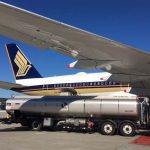Aviation technology group SITA has expanded a partnership with the Arab Air Carriers Organization (AACO) to develop a planning tool which helps airlines reduce aircraft fuel consumption, emissions and operating costs, and more easily comply with complex and increasing environmental regulations. SITA Eco Mission was developed over a year through collaboration with AACO and three of its member airlines to streamline collection and assessment of information which carriers need to report as part of their environmental compliance obligations. Abdul Wahab Teffaha, AACO’s Secretary General, said the product had grown from a need for airlines to manage increasingly complex sustainability requirements, while also providing transparency to both regulators and customers.
“This is a step in the right direction in the journey of airlines’ quest to deliver on their environmental sustainability objectives,” he said.
Added SITA CEO David Lavorel: “As we face unprecedented environmental challenges, achieving sustainability in aviation demands more than compliance. It calls for a visionary approach.”
The extended collaboration between Geneva-based SITA and AACO, which represents 37 airlines, began late last year when the two signed a Memorandum of Understanding to jointly develop a prototype of a data-driven system enabling carriers to simplify and automate reporting processes to meet their environmental compliance obligations.
The new system was also required to help cut the costs of meeting sustainability requirements, while enabling airlines to plan more efficient operations with lower emissions.
The resulting product, SITA Eco Mission, is a ground-based platform that collects data including flight schedules and fuel information from airlines’ internal systems and other information such as commodity prices and regulatory updates from a wide range of external sources.
The information is then consolidated, assessed and optimised by SITA, and delivered as data-backed insights to the relevant key departments of customer carriers to assist them in meeting their efficiency, financial and sustainability targets.
“The aviation industry remains at a critical crossroads as it works to reduce its carbon footprint and meet global sustainability targets, all while navigating increasing regulatory pressure,” said SITA.
“As the aviation industry adapts to increasingly complex regulations such as the European Union’s ReFuelEU Aviation mandate and ICAO’s CORSIA, airlines must balance emissions reduction with cost management.
“The continued partnership between SITA and AACO is focused on delivering the data-driven solution needed to simplify and automate compliance and reporting, streamline data collection and analysis, reduce the costs associated with becoming more environmentally friendly and help airlines plan their future operations so that they can meet their cost and emission targets.
“More so, the solution will support airlines in moving beyond a tactical, reactive approach, helping with smarter strategic environmental management across three key airline functions – Compliance; Strategy and Finance; and Flight Operations.”
During the past year, SITA collaborated with three AACO member airlines, which it did not identify, working with members of these functions to jointly chart what was required to navigate complicated regulations governing sustainable operations.
SITA then took the airlines’ feedback and worked with a technology user experience team to develop proof of concept for the Eco Mission product, which was taken back to the airlines for feedback and further refinement over several months.
The new planning tool has now been formally launched, and SITA expects global deployment from next year, when the EU will require all jet fuel provided at its airports to include at least a 2% blend of sustainable aviation fuel.
AACO’s Teffaha said the work performed by SITA and his member airlines had delivered a solution “invaluable not only to AACO airlines but also to the airlines of the world. This is a step in the right direction in the journey of airlines’ quest to deliver on their environmental sustainability objectives.”
Added Lavorel: “Together with AACO, we are advancing a solution that tackles these challenges directly, paving the way for a fresh, practical approach to environmental responsibility that moves the industry closer to its goals.”
Meanwhile, key AACO member Qatar Airways has strengthened its sustainability partnership with Brisbane-based Virgin Australia, a commercial ally of which it has announced plans to acquire a 25% stake, subject to regulatory approval.
The airlines have signed a MoU to expand their partnership, enabling them to collaborate on advancing sustainable aviation fuel and low carbon aviation fuel in Australia through measures including exploring certification, production and commercial use of the products.
“This MoU not only further strengthens the strategic partnership between Qatar Airways Group and Virgin Australia, but also cements the shared commitment towards achieving our common objectives in the area of sustainability,” said Qatar’s SVP Aeropolitical and Corporate Affairs, Fathi Atti.
Editor’s note: AACO Secretary General Abdul Wahab Teffaha and Igor Dimnik, VP Product, SITA will be speaking at Aviation Carbon 2024 in London on November 25/26.
Photo: Qatar Airways has expanded its sustainability partnership with Virgin Australia















More News & Features
Swiss advanced SAF technology startups Metafuels and Synhelion reach project milestones
EU states to mobilise 500 million euro support for early-mover eSAF production startups
European Commission announces Sustainable Transport Investment Plan to advance low-and-no-carbon fuels
Catagen launches SAF production company and signs offtakes with Ryanair and Shell
NATS survey shows a continuing disconnect of public attitudes to the environmental impact of flying
SWISS integrates first supplies of Synhelion solar SAF into flight operations